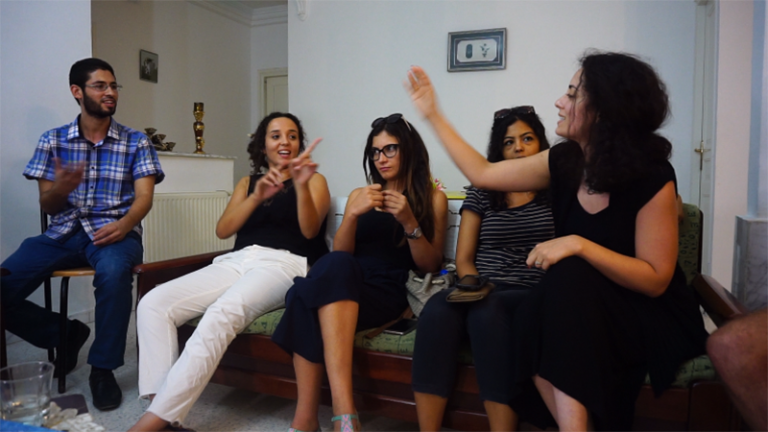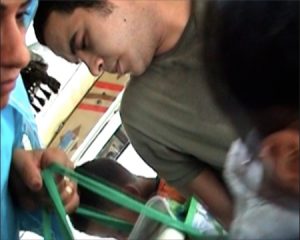Video

Barsha Kalam (a lot of talk)
How is that possible? The Tunisian people managed to peacefully overthrow a dictator and to establish a democracy, while disproportionally many radical fighters are coming from the very same country. This question was spinning in my mind.
Additionally, I was confronted with questions about the current Arab lifestyle in my personal environment as an Egyptian living in Berlin. This revealed how little insight there is on the modern Arab world. So I set out for Tunisia to find answers to these questions.
I met mainly young people with diverse backgrounds and upbringing. They opened not only their living rooms but also their hearts and minds in discussions about freedom as well as the classic Arab taboos of religion, politics, and sex.
Several groups across the country picked up the Arab tradition of debating openly in the safe environment of the private living room. They discussed the ever-present, but not daily topics of identity, colonial history, religion, and sexuality. The participants were not pre-selected according to any criteria. They came together based on an open call for participation that was channelled though various personal networks. Only the willingness to discuss was required.
One is being transferred into the middle of the discussions and cannot only listen to the different points of view that are juxtaposed without comment, but also see the impetus in the discussions and feel the spirit of change. The gestures and body language speak for themselves. One will get an understanding for how younger people in Tunisia think and how diverse the present opinions still are.
While finding the answers to my questions I was filming. The basic methods of recording and processing the material make reference to the simple ways current societal or political developments are being documented and shared in the Arab world – e.g. by smartphone. It is the work of an independent film maker with a low budget.
To watch the video please contact the artist.

About Paradise
Video, 22 min, 2014
Paradise can be a wonderful hope or conditional promise or it is the illusion itself. It may represent the dream of justice and the longing to comfort or the fear of the nothingness. The different perceptions of what may come after death influence people’s life style through time and cultures.
The film is based on number of testimonies were collected – unscientifically – from some individuals belong to different cultures from Egypt and Germany who narrate their personal imagination about the paradise or the idea of life after death. At the same time, the film shows some scenes – in a video collage style – from two pilgrims journeys (Mecca and Saint Diego way) that were done by the artist himself. These kinds of voyages through history and even before the three religions, represent the way to god, they are mostly mixed with the hope of having the prize, the paradise. We also see in the film some scenes from nature and everyday life.
To watch the video please contact the artist.
The Book
Drawings, pen on paper, Loop on a screen
The book declares, describes, explains, instructs and sometimes asks questions. Some books are everlasting and others vanish by time. Some books have been distort or misinterpreted or diverted from its meaning. Most of the time the book works as a symbol of orientation and a convincing tool either totally or partly. The book’s content mostly influences our perceptions and affects our thoughts about life and what comes after death. The book includes an idea that may turn to a belief and then into a faith till it becomes the truth.The book moves in the air to fall down in the right or the left hand, or to keep hanging in the sky having the names and going through place and time.

Monologue
Video, 5:30 min, Arabic, English subtitle, 2010
Monologue consciously splices together archive clips of old made-for-tv nationalist song and dance extravaganzas, intercut with very dry, urban video footage and abstract sound. The lack of context, persona, narrative or even perceptible intent in the video footage is in strong contrast to the hyper-intentional gestures of popular nationalist entertainment. While the songs provide strong nostalgic amusement, they represent national collective memory and a certain emotional power; by contrast, the video footage almost comes across as a laconic non-response or even emptiness.
To watch the video please contact the artist.
Spiral
Video‐Installation (2 channels ‐ loop) / Drawing‐Installation, 2010
A spiral usually emerges from a small point; dramatically moving and growing like a snowball. It might get intertwined and spread like cancer, or it might appear agile and systematic. In any case it is a complex composite, and the conflict between its lines is not easy to solve, whether it is an inner or an external, multi‐layered conflict. This fluent dynamic of the conflict constantly seeks its own escalation, leading to its core or to an undefined position within its endless possibilities.
Time For Making Cake
Video, 2:45 min, Arabic & Danish, without translation, 2006
A stream of consciousness reviewing Danish woman life’s stations, memories and photos, while she is baking a cake for her retirement party. The narrator asks (in Arabic) about the time of baking a cake, She answers (in Danish), then adds that this time it would take longer. The narrator enquires about why it would take longer; she responds that she is holding a tea party for her friends to celebrate her retirement.